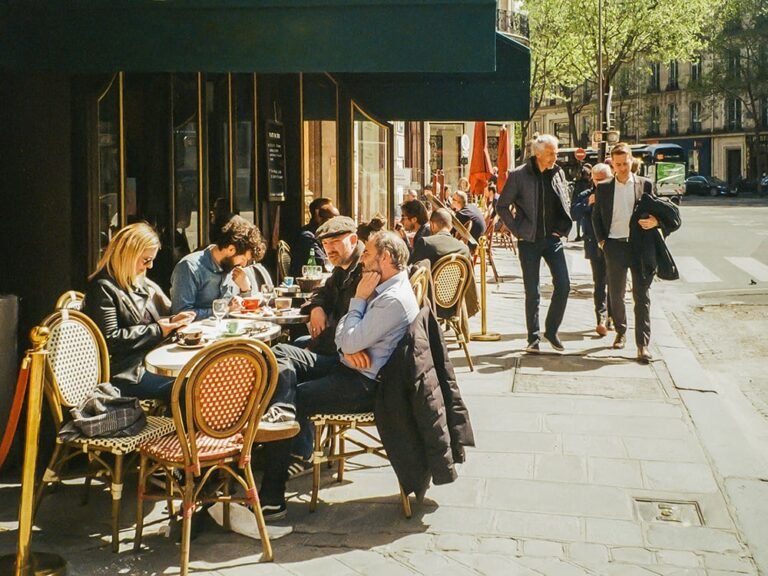penser que
“Penser que” means “to think that” and introduces opinions, beliefs, or suppositions. Unlike “penser à” (to think about) and “penser de” (to think of/have an opinion about), “penser que” specifically introduces a complete thought or statement that the speaker believes to be true.
Basic structure and meaning
“Penser que” requires the subjunctive mood in negative and interrogative forms, but uses the indicative in affirmative statements. This phrase always introduces a subordinate clause containing a complete idea.
Affirmative statements (indicative)
- Je pense qu’il viendra demain. I think he will come tomorrow.
- Elle pense que c’est une bonne idée. She thinks it’s a good idea.
- Nous pensons que le projet réussira. We think the project will succeed.
- Ils pensent qu’elle a raison. They think she is right.
Negative statements (subjunctive)
- Je ne pense pas qu’il vienne demain. I don’t think he will come tomorrow.
- Elle ne pense pas que ce soit possible. She doesn’t think it’s possible.
- Nous ne pensons pas qu’ils comprennent. We don’t think they understand.
- Il ne pense pas que vous ayez tort. He doesn’t think you are wrong.
Interrogative forms (subjunctive)
- Pensez-vous qu’il soit capable? Do you think he is capable?
- Penses-tu qu’elle puisse réussir? Do you think she can succeed?
- Pensent-ils que nous soyons prêts? Do they think we are ready?
- Pense-t-elle que ce soit nécessaire? Does she think it’s necessary?
Expressing degrees of certainty
Strong conviction
- Je pense fermement qu’il a tort. I firmly think he is wrong.
- Elle pense sincèrement que c’est la solution. She sincerely thinks it’s the solution.
- Nous pensons vraiment qu’il faut agir. We really think action is needed.
Tentative opinions
- Je pense peut-être qu’elle viendra. I maybe think she will come.
- Il pense probablement que c’est fini. He probably thinks it’s over.
- Elle pense sans doute qu’on se trompe. She no doubt thinks we are wrong.
Common contexts and usage
Personal opinions about events
- Je pense que le match sera reporté. I think the match will be postponed.
- Elle pense que la réunion durera longtemps. She thinks the meeting will last long.
- Ils pensent que le train aura du retard. They think the train will be late.
Judgments about people
- Je pense qu’elle est très intelligente. I think she is very intelligent.
- Il pense que son frère travaille trop. He thinks his brother works too much.
- Nous pensons que ce professeur explique bien. We think this teacher explains well.
Predictions and suppositions
- Je pense qu’il pleuvra cet après-midi. I think it will rain this afternoon.
- Elle pense que les prix vont augmenter. She thinks prices will increase.
- Ils pensent que la situation va s’améliorer. They think the situation will improve.
Formal and informal registers
Casual conversation
- Tu penses qu’on va s’amuser? Do you think we’re going to have fun?
- Je pense qu’elle est fâchée. I think she’s angry.
- On pense que c’est mieux comme ça. We think it’s better this way.
Professional settings
- Je pense que cette stratégie sera efficace. I think this strategy will be effective.
- Nous pensons que les résultats sont encourageants. We think the results are encouraging.
- Elle pense que le budget suffit. She thinks the budget is sufficient.
Academic or formal writing
- L’auteur pense que cette théorie est dépassée. The author thinks this theory is outdated.
- Les experts pensent que la tendance se confirmera. Experts think the trend will be confirmed.
- Le rapport pense que des améliorations sont nécessaires. The report thinks improvements are necessary.
Contrasting with similar expressions
“Penser que” vs “croire que”
Both mean “to think that” but “croire que” implies stronger belief:
- Je pense qu’il est parti. I think he left. (opinion)
- Je crois qu’il est parti. I believe he left. (stronger conviction)
“Penser que” vs “trouver que”
“Trouver que” expresses a more immediate reaction:
- Je pense que ce film est bon. I think this movie is good. (considered opinion)
- Je trouve que ce film est bon. I find this movie good. (immediate reaction)
Time expressions with “penser que”
Past events
- Je pense qu’elle est arrivée hier. I think she arrived yesterday.
- Il pense que nous avons eu raison. He thinks we were right.
- Elle pense qu’ils ont terminé à temps. She thinks they finished on time.
Future events
- Je pense qu’il partira bientôt. I think he will leave soon.
- Nous pensons que ça finira bien. We think it will end well.
- Elle pense qu’ils reviendront l’année prochaine. She thinks they will return next year.
Common errors to avoid
Mood confusion
Incorrect: Je ne pense pas qu’il viendra. Correct: Je ne pense pas qu’il vienne. I don’t think he will come.
Missing “que”
Incorrect: Je pense il est malade. Correct: Je pense qu’il est malade. I think he is sick.
Wrong verb choice
Incorrect: Je pense à qu’elle soit fatiguée. Correct: Je pense qu’elle est fatiguée. I think she is tired.
Expressing uncertainty and doubt
With conditional mood
- Je penserais que c’est possible. I would think it’s possible.
- Elle penserait que nous avons tort. She would think we are wrong.
- Nous penserions que c’est trop tard. We would think it’s too late.
With qualifying expressions
- Je pense bien qu’il comprend. I do think he understands.
- Elle pense toujours qu’on se trompe. She always thinks we’re wrong.
- Il pense encore qu’elle reviendra. He still thinks she will come back.
Responding with “I think so” and “I don’t think so”
When answering questions with “I think so” or “I don’t think so,” French uses specific constructions:
“I think so” translations
- Je pense que oui. I think so.
- Je crois que oui. I believe so.
- Il me semble que oui. It seems so to me.
“I don’t think so” translations
- Je ne pense pas. I don’t think so.
- Je pense que non. I think not.
- Je ne crois pas. I don’t believe so.
In context
- Tu penses qu’elle viendra? – Je pense que oui. Do you think she’ll come? – I think so.
- Il pleuvra demain? – Je ne pense pas. Will it rain tomorrow? – I don’t think so.
- C’est fini? – Je pense que non. Is it over? – I think not.
Regional variations and colloquial usage
Informal speech patterns
- Moi, je pense que c’est nul. Me, I think it’s rubbish.
- Tu penses qu’elle va dire oui? Do you think she’ll say yes?
- J’pense qu’il faut y aller. I think we should go.
Emphatic forms
- Je pense bel et bien qu’elle a tort. I really do think she’s wrong.
- Il pense dur comme fer que c’est vrai. He firmly believes it’s true.
- Elle pense mordicus que c’est impossible. She stubbornly thinks it’s impossible.






